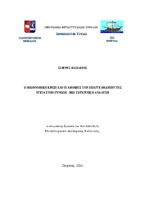Η οικονομική κρίση και οι αμοιβές των επαγγελματιών της υγείας στην Ευρώπη: μια συγκριτική ανάλυση.
The financial crisis of 2008 and the remuneration of health professionals in Europe: a comparative analysis.

View/
Subject
Οικονομικά της υγείας ; Οικονομικές κρίσεις ; Μισθοί και ημερομίσθια -- Ευρώπη ; Ιατρικό προσωπικό ; Νοσηλευτές -- Υγεία και υγιεινήAbstract
The 2008 global financial crisis affected almost every European country. The European countries faced an increase in budget deficit, public debt and unemployment, while the social income shrunk. This crisis led the governments to take measures in order to support their economies. For some countries, these measures aimed at the reduction of costs in the various sectors of their economy. One of these sectors was the Health Sector. This should be achieved through the rational management of resources of this sector in order to offer high quality services at the lowest possible cost, while making the necessary systemic reforms. One of the greatest costs in the health sector is the health professionals’ remuneration. In several countries, governments promoted policies that were related to layoffs and to the pausing of replacing the staff that retire or finally, they implemented restrictive policies on new recruitments and appointments of alternates. Another set of measures was related to the reduction of wages, a common trend in the private and public sector. The final decision about whether or not, the payments should be reduced in order to reduce the total cost, differed in each country. In this study, we examine these fluctuations in health professionals’ remuneration for the years 2006 up to 2011. The purpose of this study is to compare the revenues of specific categories of health professionals, as well as to study whether they are well or poorly paid compared to other categories of professionals in each country and to reach to conclusions about the impact that the 2008 economic crisis had on the remuneration of health professionals. The occupational groups examined were these of nurses and general practitioners and specialists, both salaried and self-employed. Two main limitations regarding the data comparability should be taken into account when comparing the remuneration levels of doctors and nurses presented in this study. The first limitation refers to the national source of data, which in some of the countries refer only to the main source of income for the doctors, excluding additional payments they may receive from their professional activity. The second limitation has to do with the fact that the data for most countries refer to doctors and nurses who are practicing on a full time basis. However, in some other countries, data include doctors in practice and those who work part time. The data were collected from the official website of the Organization for Economic Cooperation and Development and refer to the annual income of general doctors, specialists and nurses in 24 European countries between 2006 and 2011. Data related to the relationship between the annual remuneration of particular occupational health groups and the average annual salaries of every professional in each country, are also presented. The comparison of the data proved that the self-employed physicians have much higher revenues than physicians who are paid via salary, while the gap between the examined European countries is enormous. Compared to the average wage, General Practitioners’ payments are much higher, while the 2008 crisis does not seem to have affected their revenue negatively. For the group of specialists our results lead to similar conclusions with these referring to the general practitioners, but in this case the wage differences are even larger between the salaried and the self-employed ones, as well as between several European countries. Large wage differences between the European countries are also noticed for nurses, while it is noticed that they are poorly paid relatively to other professionals. Economic crisis has not affected negatively these health professionals either. Finally, we reach to the conclusion that specialists are better-paid compared to general practitioners, except in a few cases. Summarizing, economic crisis has affected to a small extent or not even at all, the health professionals under consideration, for the years where data were available. Due to the fact that this crisis is ongoing, we should wait and see what might happen in the following years, as there are indications that decreases in revenue are highly possible to occur in the near future.

